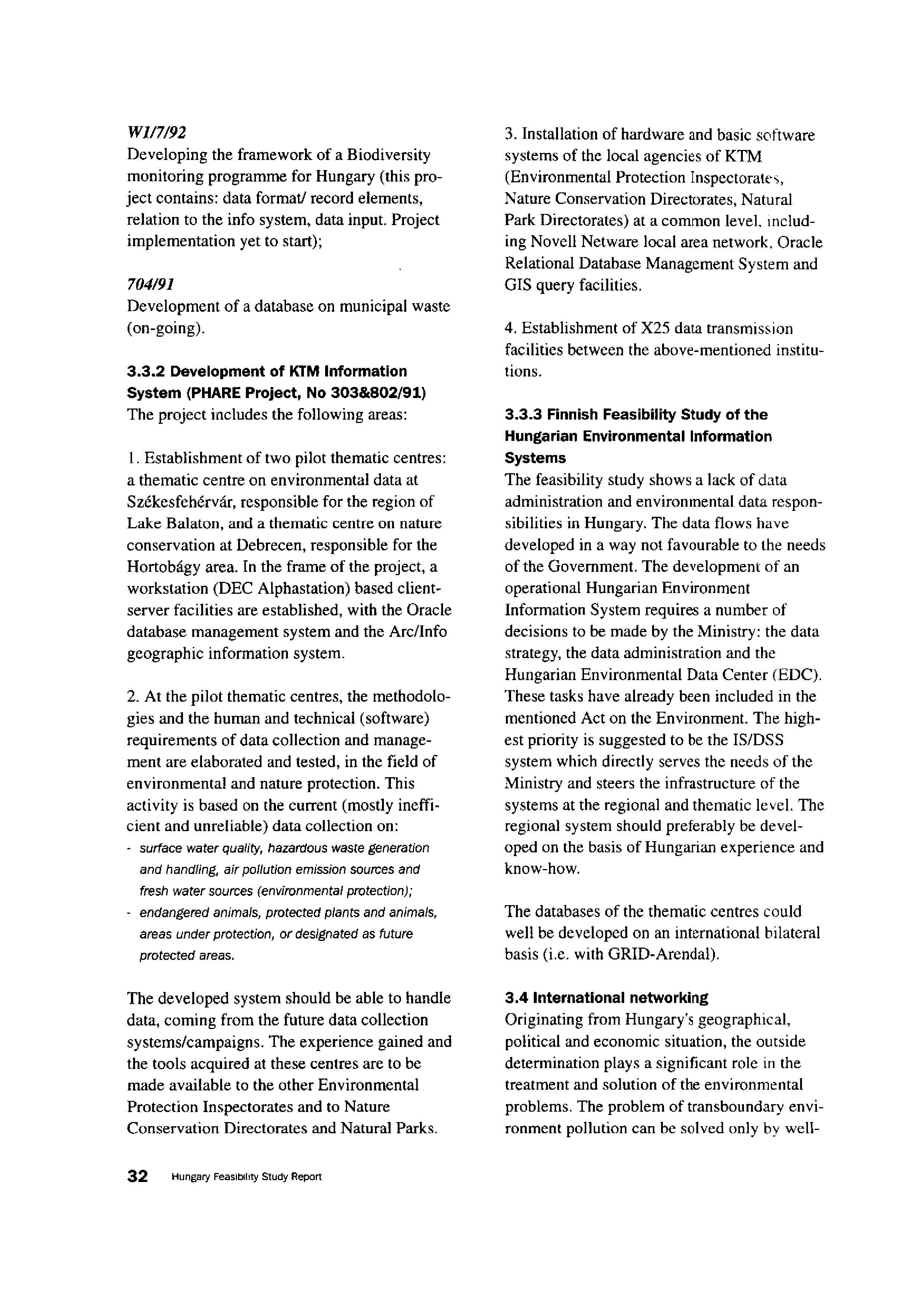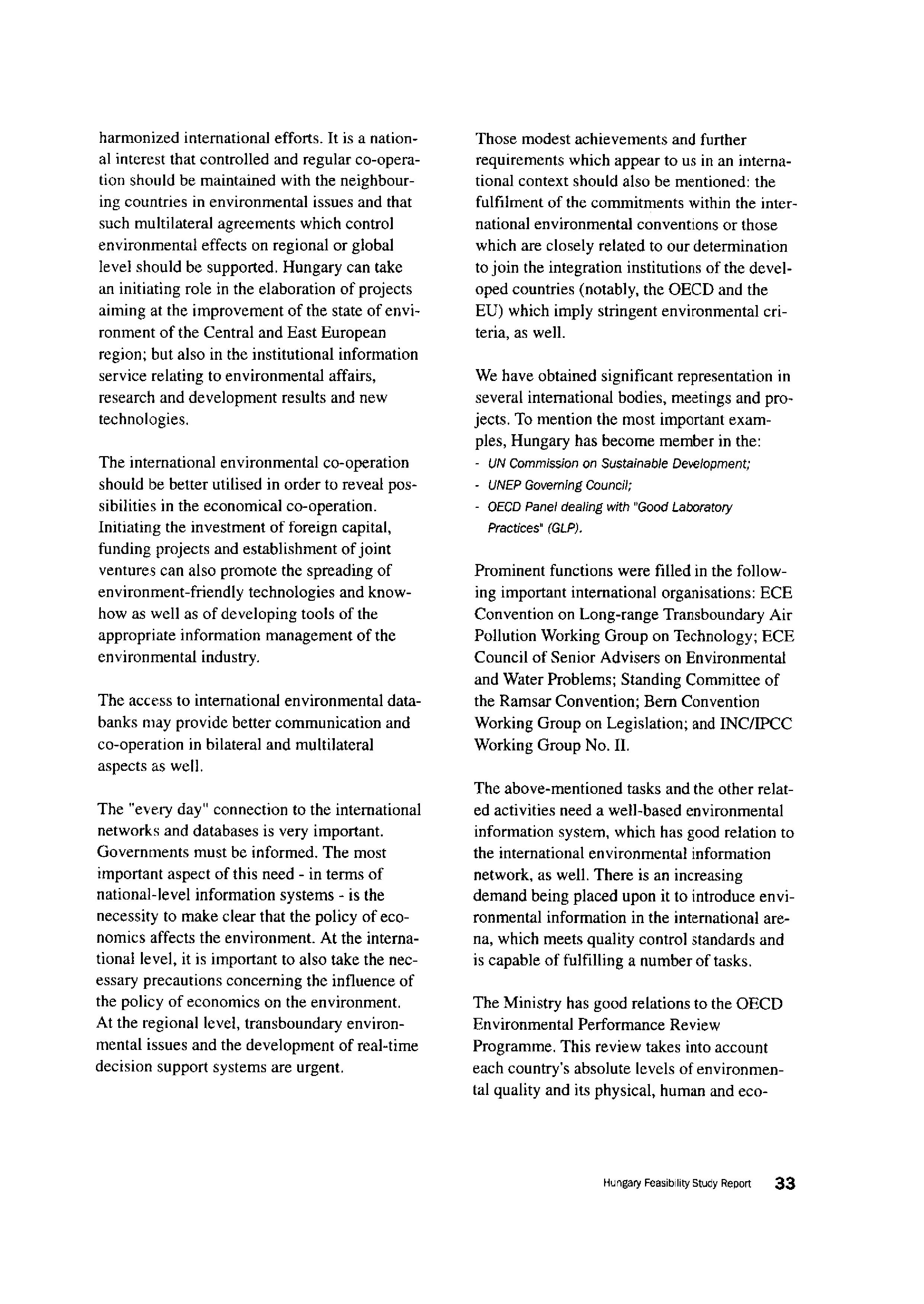
4 minute read
3.4 International Networking
WJ/7/92 Developing the framework of a Biodiversity monitoring programme for Hungary (this project contains: data formatl record elements, relation to the info system, data input. Project implementation yet to start);
704/91
Development of a database on municipal waste (on-going).
Installation of hardware and basic software systems of the local agencies of KTM (Environmental Protection Inspectorates, Nature Conservation Directorates, Natural Park Directorates) at a common level, including Novell Netware local area network. Oracle Relational Database Management System and GIS query facilities.
Establishment of X25 data transmission facilities between the above-mentioned institu-
3.3.2 Development of KiM Information
tions.
System (PHARE Project, No 303&802191)
The project includes the following areas:
Establishment of two pilot thematic centres: a thematic centre on environmental data at Szdkesfehérvár, responsible for the region of Lake Balaton, and a thematic centre on nature conservation at Debrecen, responsible for the I-Iortobágy area. In the frame of the project, a workstation (DEC Alphastation) based clientserver facilities are established, with the Oracle database management system and the Arc/Info geographic information system.
At the pilot thematic centres, the methodologies and the human and technical (software) requirements of data collection and management are elaborated and tested, in the field of environmental and nature protection. This activity is based on the current (mostly inefficient and unreliable) data collection on:
- surface water quality, hazardous waste generation and handling, air pollution emission sources and fresh water sources (environmental protection); - endangered animals, protected plants and animals,
3.3.3 Finnish Feasibility Study of the Hungarian Environmental Information Systems
The feasibility study shows a lack of data administration and environmental data responsibilities in Hungary. The data flows have developed in a way not favourable to the needs of the Government. The development of an operational Hungarian Environment Information System requires a number of decisions to be made by the Ministry: the data strategy, the data administration and the Hungarian Environmental Data Center (EDC). These tasks have already been included in the mentioned Act on the Environment. The highest priority is suggested to be the IS/DSS system which directly serves the needs of the Ministry and steers the infrastructure of the systems at the regional and thematic level. The regional system should preferably be developed on the basis of Hungarian experience and know-how. The databases of the themalic centres could areas under protection, or designated as future well be developed on an international bilateral
protected areas. basis (i.e. with GRID-Arendal).
3.4 International networking
Originating from Hungary's geographical, political and economic situation, the outside determination plays a significant role in the treatment and solution of the environmental problems. The problem of transboundary environment pollution can be solved only by well-
The developed system should be able to handle data, coming from the future data collection systems/campaigns. The experience gained and the tools acquired at these centres are to be made available to the other Environmental Protection Inspectorates and to Nature Conservation Directorates and Natural Parks.
32 Hungary Feasibihty Study Report
harmonized international efforts. It is a national interest that controlled and regular co-operation should be maintained with the neighbouring countries in environmental issues and that such multilateral agreements which control environmental effects on regional or global level should be supported. Hungary can take an initiating role in the elaboration of projects aiming at the improvement of the state of environment of the Central and East European region; but also in the institutional information service relating to environmental affairs, research and development results and new technologies.
The international environmental co-operation should be better utilised in order to reveal possibilities in the economical co-operation. Initiating the investment of foreign capital, funding projects and establishment of joint ventures can also promote the spreading of environment-friendly technologies and knowhow as well as of developing tools of the appropriate information management of the environmental industry.

The access to international environmental databanks may provide better communication and co-operation in bilateral and multilateral aspects as well.
The "every day' connection to the international networks and databases is very important. Governments must be informed. The most important aspect of this need - in terms of national-level information systems - is the necessity to make clear that the policy of economics affects the environment. At the international level, it is important to also take the necessary precautions concerning the influence of the policy of economics on the environment. At the regional level, transboundary environmental issues and the development of real-time decision support systems are urgent. Those modest achievements and further requirements which appear to us in an international context should also be mentioned: the fulfilment of the commitments within the international environmental conventions or those which are closely related to our determination to join the integration institutions of the developed countries (notably, the OECD and the EU) which imply stringent environmental criteria, as well.
We have obtained significant representation in several international bodies, meetings and projects. To mention the most important examples, Hungary has become member in the: - UN Commission on Sustainable Development; - UNEP Governing Council; - OECD Panel dealing with Good Laboratoiy
Practices (GLP).
Prominent functions were filled in the following important international organisations: ECE Convention on Long-range Transboundary Air Pollution Working Group on Technology; ECE Council of Senior Advisers on Environmental and Water Problems; Standing Committee of the Ramsar Convention; Bern Convention Working Group on Legislation; and INC/[PCC Working Group No. II.
The above-mentioned tasks and the other related activities need a well-based environmental information system, which has good relation to the international environmental information network, as well. There is an increasing demand being placed upon it to introduce environmental information in the international arena, which meets quality control standards and is capable of fulfilling a number of tasks.
The Ministry has good relations to the OECD Environmental Performance Review Programme. This review takes into account each country's absolute levels of environmental quality and its physical, human and ecU-
Hirngaiy Feasibility Study Report 33







